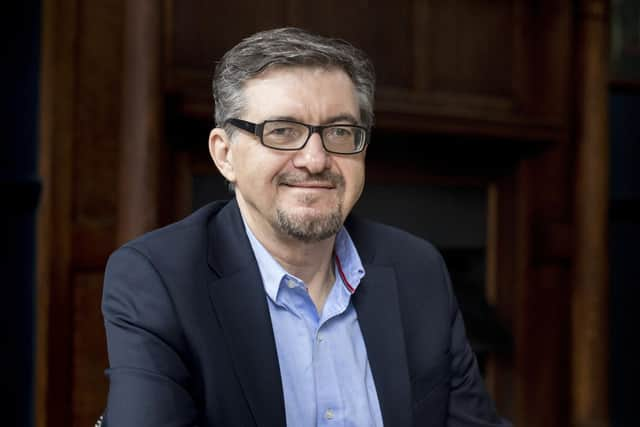Edinburgh International Book Festival round-up: Serhii Plokhy with Alan Little | Cal Flynn, Matthew Green and Judith Schalansky | David Hendy
Allan Little’s first question to Ukrainian historian Serhii Plokhy was a personal one: what is it like to watch your country being blown apart? Plokhy, who is a Professor of History at Harvard, described the Russian invasion in February as “a punch to the stomach”, but added: “No one gave Kyiv more than 72 hours. The country and the president showed a resilience few people expected. They are fighting and will continue to fight.”
His recent book The Gates of Europe: A History of Ukraine, which starts in Roman times, describes how Ukraine has long sat on the cusp of East and West. It has been pulled both ways, and it was only in 2014, with the Russian annexation of the Donbas and the Crimea, that the country abruptly picked a side and aligned itself with Europe. President Putin, meanwhile, sees regaining control of the second largest republic in the former USSR as essential to his plan to rule the post-Soviet space.
Advertisement
Hide AdUkraine’s long sense of kinship with Russian, however, led to both parties in the war misreading the other: Ukrainians did not believe the Russians would actually invade until they did so, and Russia did not believe Ukraine would fight back. The troops had their dress uniforms in their packs, Plokhy said, ready to march in triumph through Kyiv.


His research on nuclear disasters, published in his book Atoms and Ashes, means that he has revisited the story of Chernobyl as a historian. He cautioned that the larger concern in the current war is not the use of nuclear missiles but the risk that electricity – essential to cooling even redundant nuclear reactors – will be cut off during the conflict, increasing the potential for accidents.
Chernobyl surfaced again in a stimulating main stage discussion between three writers, Cal Flynn, Matthew Green and Judith Schalansky, about our fascination with lost things and abandoned places. Flynn visited the site of the disaster when researching her book Islands of Abandonment, and spoke about how the resurgence of nature in the exclusion zone has much to teach us about the resilience of different species.
Schalansky, whose latest book An Inventory of Losses was longlisted for the 2021 International Booker Prize, described how growing up in the East German city of Greifswald, which was largely left to crumble in the GDR years, fuelled her interest in ruins, and spoke of her love for the “blurry but beautiful buffer zone between the fictional and factual”.
Green tooks us to lost settlements (Winchelsea) and rediscovered ones (Skara Brae) as he spoke about his book Shadowlands: A Journey Through Lost Britain, while Flynn explored our fascination with post-industrial ruins, adding that ruin-love is a balancing act: often it has taken a tragedy, personal or societal, to create the melancholy beauty beloved of the casual observer.
It might be unfair to talk about the BBC in the context of ruins although, listening to David Hendy, Emeritus Professor at the University of Sussex and author of The BBC: A People’s History, it was difficult not to feel a pang of nostalgia for better days. Given access to the BBC’s oral archive of interviews with its staff, he discovered an organisation full of quirky humanity which sprang from an ideal about using broadcasting to build a better world.
Advertisement
Hide AdWhile the fortunes of the BBC have always ebbed and flowed, he said, it is now facing “a dangerous moment” of a different magnitude. “We have a government which does not care about institutions. Things can be broken if it helps them stay in power. It wouldn’t matter to them if a broadcasting institution famous around the world were to disappear.”
He finished with a dire warning: in the next 50 years, the BBC could be reduced to “something like public service broadcasting in the USA… but it depends how you vote in the next election!”